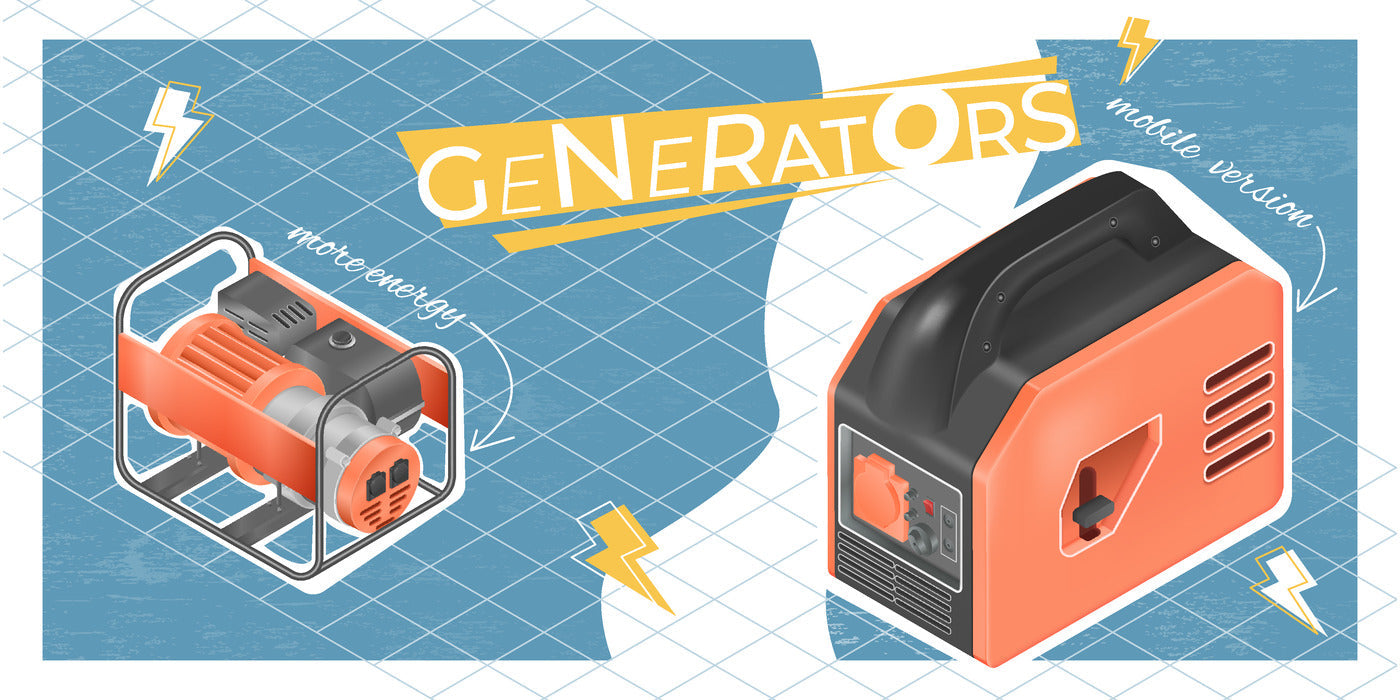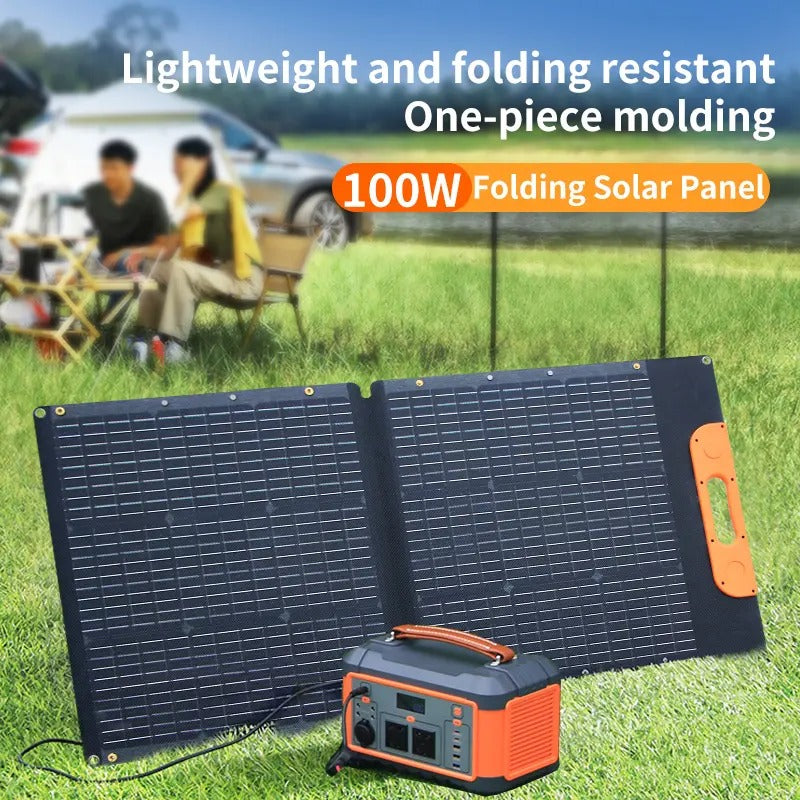When it comes to outdoor activities, emergencies, or off-grid living, both portable power stations and generators serve similar purposes: providing electricity. But despite their shared function, they have key differences in terms of performance, convenience, and use cases. If you’re considering investing in one of these power sources, it’s essential to understand their distinctions.
In this article, we will explore the differences between portable power stations and generators, help you determine which one suits your needs, and explain why each option is beneficial for specific scenarios. Whether you need backup power for a camping trip, or a reliable source of energy during a power outage, we’ll break down the advantages and disadvantages of each.
What is a Portable Power Station?
A portable power station is a compact, rechargeable battery pack that provides energy on the go. It stores electricity in large lithium-ion batteries, which can be charged using solar panels, wall outlets, or car adapters. These devices are typically used for powering small appliances, electronics, and devices like laptops, phones, and even medical equipment during outdoor activities, camping, or emergencies.
For those interested in solar-compatible and heavy-duty battery options, the Coolnut power station range provides portable yet powerful energy backups ideal for outdoor trips, emergencies, and off-grid setups with multiple charging options.
Key Features of Portable Power Stations:
-
Compact and lightweight for easy transport.
-
Rechargeable batteries with solar panel compatibility.
-
Versatile charging options, including USB ports, AC outlets, and car adapters.
-
Environmentally friendly, especially when charged using solar power.
Advantages of Portable Power Stations
-
Portability: Unlike traditional generators, portable power stations are easy to carry and transport, making them perfect for outdoor activities like camping, road trips, or RVing.
-
Quiet Operation: Since they rely on rechargeable batteries, portable power stations operate silently, unlike noisy gas-powered generators.
-
Environmentally Friendly: Portable power stations can be charged with solar energy, reducing your carbon footprint. For those who prioritize sustainability, these stations offer a clean alternative.
-
Multiple Charging Options: These stations come with multiple ports to power various devices like phones, laptops, drones, and even mini-fridges, all at the same time.
Need a lightweight charging companion for daily use? Check out this compact 5000 mAh power bank that’s perfect for keeping phones and small gadgets charged when you're traveling or camping without access to wall outlets.
Disadvantages of Portable Power Stations
-
Limited Power Capacity: While portable power stations are excellent for small devices, their power capacity may not be sufficient for larger appliances or tools.
-
Charging Time: Depending on the size of the battery, charging a portable power station can take a longer time compared to refueling a generator, especially if relying on solar panels.
What is a Generator?
A generator is a machine that converts mechanical energy into electrical energy, typically powered by gas, diesel, or propane. Generators come in various sizes and are commonly used to provide backup power for homes, businesses, and construction sites. Unlike portable power stations, generators produce power continuously as long as fuel is available, making them suitable for powering larger appliances and equipment.
Key Features of Generators:
-
Fuel-powered, usually using gasoline, diesel, or propane.
-
Higher power output than portable power stations.
-
Continuous power supply when fuel is available.
-
Loud operation, depending on the model.
Advantages of Generators
-
Higher Power Output: Generators are typically more powerful than portable power stations, providing energy for large appliances, tools, and even homes.
-
Extended Run Time: As long as you have fuel, generators can run continuously, making them ideal for long-term power needs.
-
Cost-Effective: While generators can be loud, they tend to be less expensive upfront compared to high-capacity portable power stations.
Disadvantages of Generators
-
Noise: Generators tend to be much louder than portable power stations, especially when operating at full capacity. This can be disruptive in quieter environments like campsites or residential areas.
-
Fuel Dependency: Unlike portable power stations, which can be recharged with solar energy, generators require a constant supply of fuel. This makes them less reliable in the long term if fuel is unavailable.
-
Heavy and Bulky: Generators are much larger and heavier compared to portable power stations, making them harder to transport.
Portable Power Station vs Generator: Key Differences
1. Power Capacity
While generators are known for their larger power capacities, portable power stations are designed for smaller, more portable power needs. If you need a device to power larger appliances like air conditioners, power tools, or refrigerators, a generator may be the better choice. However, if you only need power for small devices, such as smartphones, laptops, and lights, a portable power station is more than sufficient.
Before choosing your next power station, you may want to read our in-depth Explorer 1500 review that covers real-world performance, charging capabilities, and how it compares to traditional generator setups in remote conditions.
2. Noise Levels
One of the biggest differences between generators and portable power stations is the noise level. Generators can be very loud, particularly when running at high loads, while portable power stations operate silently, making them ideal for use in quiet environments like campgrounds, offices, and during outdoor activities.
3. Fueling
Generators run on fuel such as gasoline, diesel, or propane, requiring regular refueling. In contrast, portable power stations rely on rechargeable batteries that can be powered by solar panels, car chargers, or wall outlets. This makes portable power stations a more environmentally friendly option if you use solar charging.
4. Portability
Portable power stations are compact, lightweight, and designed for easy transport. You can easily take them on camping trips, road trips, or outdoor events. Generators, on the other hand, are heavier and bulkier, which makes them less convenient for mobile use.
5. Usage Time
Generators can run for extended periods as long as there is fuel, making them ideal for long-term power needs. Portable power stations, however, have a limited battery life and require recharging after a certain amount of usage.
Which One is Right for You?
-
For small power needs (e.g., charging phones, laptops, running small appliances): A portable power station is the better choice due to its portability, silence, and solar-powered capabilities.
-
For large power needs (e.g., running large appliances, construction sites): A generator is a more suitable option due to its higher power output and continuous operation as long as fuel is available.
Ultimately, the choice between a portable power station and a generator depends on your specific requirements, the devices you want to power, and how long you need power to last.
Looking for high-performance energy solutions for all kinds of use cases? Explore a wide range of backup devices, power banks, and portable stations offered by Moerdon power solutions, a trusted name in reliable electronic products for modern needs.




Leave a comment
This site is protected by hCaptcha and the hCaptcha Privacy Policy and Terms of Service apply.